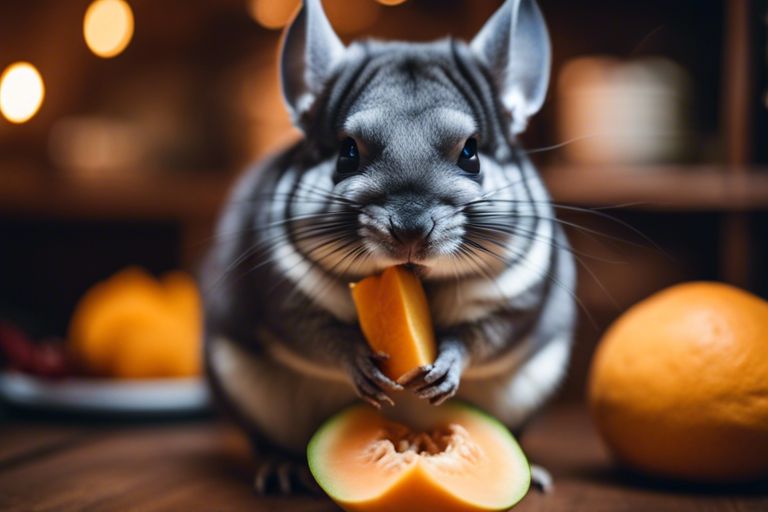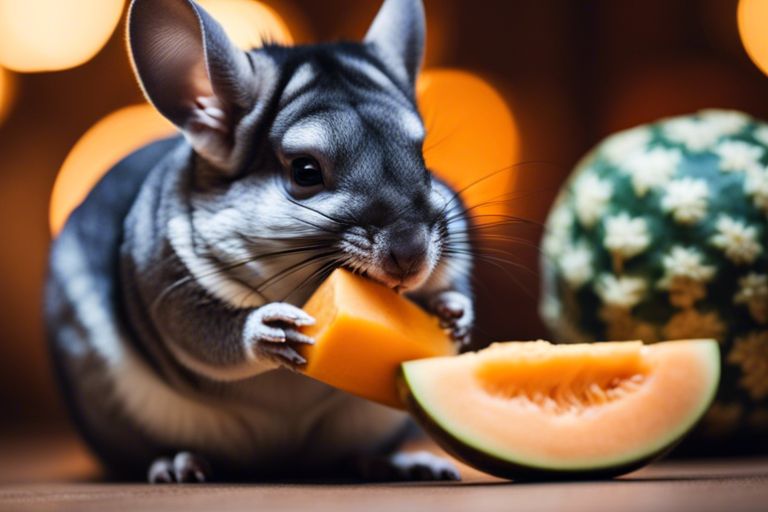Chinchillas are adorable and fluffy pets that require a specific diet to stay healthy. Concerning feeding them fruits like cantaloupe, caution is advised. Cantaloupe contains a high amount of natural sugars, which can be harmful to chinchillas if consumed in excess. While a small amount as an occasional treat may be okay, overfeeding cantaloupe can lead to digestive issues and obesity in these small critters. It’s crucial to provide chinchillas with a balanced diet primarily consisting of hay and pellets to ensure their well-being. Always consult with a veterinarian or a chinchilla diet specialist before introducing new foods into your pet’s menu.
Key Takeaways:
- Chinchillas should not eat cantaloupe: Cantaloupe is high in sugar and water content, which may lead to digestive issues in chinchillas.
- Stick to a chinchilla’s natural diet: Chinchillas are herbivores and should primarily consume hay, pellets, and limited fresh vegetables as treats.
- Monitor chinchilla’s diet for optimal health: It is crucial to provide a balanced diet to chinchillas to ensure their overall well-being and prevent any health complications.
Understanding Chinchillas’ Dietary Needs
Natural Diet of Chinchillas in the Wild
You may be surprised to learn that in the wild, chinchillas primarily feed on grasses, leaves, and seeds. Their digestive system is specifically designed to process high-fiber, low-fat vegetation. This diet ensures they get the necessary nutrients to thrive in their natural habitat.
Nutritional Requirements of Domesticated Chinchillas
To meet the nutritional needs of domesticated chinchillas, it is crucial to mimic their wild diet as closely as possible. Chinchillas require a diet high in fiber and low in fat, which can be achieved through good quality hay and specially formulated chinchilla pellets. Fresh water should always be available to prevent dehydration.
Chinchillas should avoid foods high in sugar, such as fruits like cantaloupe, as it can lead to digestive issues and obesity. Snacks like raisins and nuts should also be given sparingly, as they are high in fat and can cause health problems over time.

Cantaloupe Basics
Little known fact: chinchillas are not big fans of fruits due to their high sugar content, but they can enjoy an occasional treat of cantaloupe. This juicy and sweet melon can be a refreshing snack for your chinchilla if given in moderation.
Nutritional Composition of Cantaloupe
With a high water content and low calorie count, cantaloupe is a hydrating and nutrient-rich fruit. It is packed with vitamins A and C, which are vital for the overall health and immune system of your chinchilla. Additionally, cantaloupe contains fiber, which can aid in digestion.
Potential Benefits and Risks of Feeding Cantaloupe to Chinchillas
Cantaloupe can be a tasty and healthy addition to your chinchilla’s diet if given in moderation. However, it is important to note that the high sugar content in cantaloupe can lead to obesity and other health issues in chinchillas when overfed. Always offer fresh cantaloupe in small portions as an occasional treat.
Plus, be cautious with the seeds and rind of the cantaloupe, as these parts can be a choking hazard for your chinchilla. Remove all seeds and skin before offering your pet a piece of cantaloupe to enjoy.
Feeding Chinchillas Cantaloupe
How to Properly Introduce Cantaloupe into a Chinchilla’s Diet
Many chinchilla owners wonder if they can safely feed their furry friends cantaloupe. The good news is that cantaloupe can be a tasty treat for chinchillas when offered in moderation. To introduce cantaloupe into a chinchilla’s diet, start by offering a small piece and monitor for any adverse reactions.
Signs of Health Issues Related to Improper Diet in Chinchillas
On improper diet can lead to various health issues in chinchillas. Signs of health issues related to an improper diet may include diarrhea, teeth problems, obesity, and gastrointestinal stasis. It is crucial to monitor your chinchilla’s diet and make sure they are getting the proper nutrients.
Chinchillas are known for their sensitive digestive systems, so it’s important to provide them with a balanced diet to prevent any health issues. Diarrhea can quickly lead to dehydration, teeth problems can cause pain and difficulty eating, obesity can lead to a host of other health issues, and gastrointestinal stasis can be life-threatening if not addressed promptly.
Alternative Fruits and Treats for Chinchillas
Safe Fruits for Chinchilla Consumption
Your chinchilla’s diet can be expanded to include a variety of safe fruits in moderation. Some options include apples, blueberries, strawberries, and raspberries. These fruits can be offered as occasional treats to provide enrichment and variety to your chinchilla’s diet. Note, fruits should only make up a small part of their overall diet, as chinchillas require a diet high in hay and pellets.
Fruits to Avoid in a Chinchilla’s Diet
Treats like avocado, citrus fruits, and grapes should be avoided in a chinchilla’s diet as they can be harmful to their health. Avocado contains toxic elements that can be harmful to chinchillas, while citrus fruits are too acidic for their sensitive digestive systems. Grapes can also pose a choking hazard due to their size and seeds, which can be dangerous for chinchillas.
An important aspect to consider when choosing fruits for your chinchilla is their high sugar content. Chinchillas have sensitive digestive systems that are not equipped to handle high levels of sugar, which can lead to digestive issues and obesity. It is crucial to limit the amount of sugary fruits in their diet to maintain their overall health and well-being.
Final Words
With this in mind, it is important to remember that while chinchillas can eat a variety of fruits, cantaloupe should be avoided due to its high sugar content and risk of digestive issues. It is safer to stick to chinchilla-friendly fruits such as apples, bananas, and grapes in moderation to ensure the health and well-being of your furry friend. Always consult with a veterinarian before introducing new foods into your chinchilla’s diet to avoid any potential health complications. Be mindful of, the key to keeping your chinchilla happy and healthy is providing a balanced diet and plenty of fresh hay and water.
